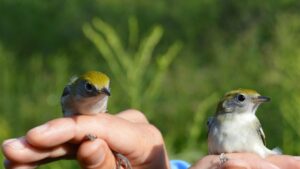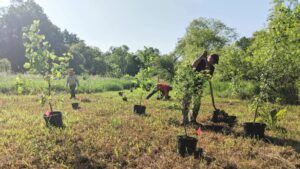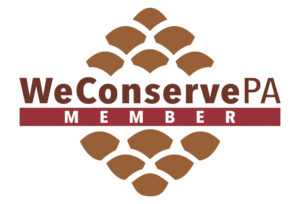At our most recent free lunch & learn at the Rushton Conservation Center, Meagan Hopkins-Doerr provided a wealth of useful information about the invasive and destructive Spotted Lanternfly (SLF). Meagan is Coordinator for the Master Gardeners of Chester County and Master Watershed Stewards of Chester & Delaware Counties, and she travels the area providing informative sessions like this one on a variety of topics.
Background
SLF is an invasive species that was discovered in Berks County back in 2014. With few natural predators, it has spread and threatens the Pennsylvania economy. It is critical to manage this pest now. SLF was also introduced in South Korea, which is similar in size to Pennsylvania.
So, here are some of the highlights of actions you can take now:
Destroy the Eggs
The SLF adults have now died from the cold, but have left behind their egg masses. Here’s a photo of what they look like.
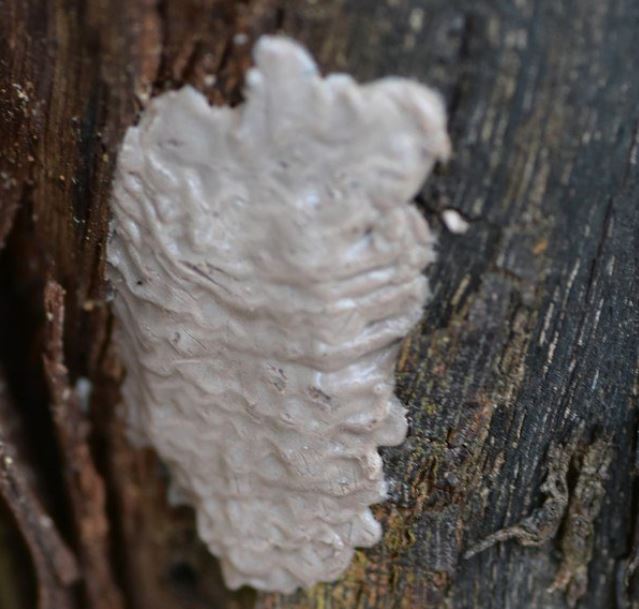
Females will lay eggs on virtually any outdoor surface. In addition to trees you may find them on:
- Fence posts
- Grills
- Sheds
- Lawn furniture
- Outdoor seating cushions
- Exterior walls (siding, brick, stone)
- Flower boxes
- Bird feeders
Careful inspection of your property for the egg masses is an important step in controlling the spread of the SLF. Each egg mass can contain, on average, 37 eggs. Therefore it’s important to destroy any you see. When you see one, here’s what you do:
- Scrape the egg mass into a jar or similar container
- Soak the eggs in isopropyl (rubbing) alcohol
- Dispose of the container
You can also smash the egg masses, or burn them if you have a fire pit.
Limit the Spread
Willistown Conservation Trust’s program area is within the quarantine zone. At all stages of growth, SLF are very efficient hitchhikers. There are some things you can do to limit the spread of the SLF:
- Check your car (wheel wells, grille) and any trailers and remove all SLF before departing. This is important ESPECIALLY before driving out of the quarantine zone.
- Don’t park under infested trees
- Do not transport firewood
- Inspect any material stored outdoors before transporting it elsewhere
Remove Tree of Heaven
If you use landscapers or arborists, ask if they have received an SLF permit from the PA Department of Agriculture. For more information about the permit visit: https://extension.psu.edu/does-your-business-need-a-spotted-lanternfly-permit
Though the SLF will feed on other plants, the Tree of Heaven is one of its preferred hosts. If you have Tree of Heaven, it is important to remove them. You MUST use an appropriate herbicide to treat the tree before cutting it down or it will multiply.
Get Ready for Hatching
Banding. When the SLF eggs hatch in the spring, the nymphs will begin to forage. By banding trees they prefer, you can help to capture them. Bands should be checked regularly and replaced as needed. Excluder cages should be used to keep other animals away from the bands. Read more about use of traps here: https://extension.psu.edu/using-traps-for-spotted-lanternfly-management
Insecticides. If you have an infestation, it may be necessary to use insecticides. There are a variety of systemic and contact insecticides with varying degrees of efficacy against the SLF. Always read and follow the label before applying any insecticide. Additional information can be found here: https://extension.psu.edu/spotted-lanternfly-management-and-pesticide-safety
See the Penn State Extension website for instructions on how to band trees and for selection and use of insecticides.
Report. Report. Report.
Researchers need data. By reporting sightings of SLF you will help researchers understand how the SLF are moving. To report SLF you can go online to extension.psu.edu/spotted-lanternfly or call 1-888-4BADFLY.
Learn More
You can download a variety of helpful information at the PSU Extension website. The Trust also has some print materials left over from the lunch & learn. You’re welcome to stop by our office and pick up some while supplies last. We also have a small supply of scraper cards, which also have helpful information on them including the number to call to report SLF.
Watch for more informative lunch & learns coming up.


